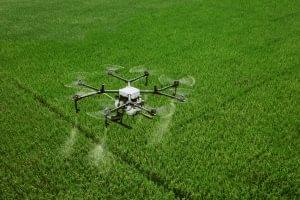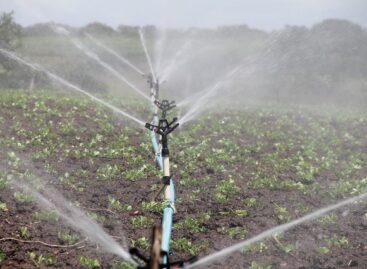The inspection campaign supporting businesses advertising drone plant protection services has ended
In the past period, the National Food Chain Safety Office (Nébih) has assisted crop protection service companies with spraying drones with supportive on-site inspections in order to provide services to domestic farmers in accordance with the legal regulations applicable to them in the future. The visits ended with useful, practical experiences, so they are expected to continue next spring.

(Photo: Pixabay)
During the spring period, Nébih received numerous indications that drone plant protection services are being advertised and recommended to producers on various social media platforms. Given the fact that drone plant protection activities for the purpose of product production and services cannot be legally carried out in Hungary at the moment, but at the same time plant protection activities for experimental purposes can be carried out with a spraying drone – with a permit – it has become necessary to clarify the issues. In the spirit of this goal, Nébih launched the supporting inspections, during which the experts provided detailed information on the conditions required for the sake of legality. At the same time, the authority assessed the shortcomings to which all stakeholders should pay close attention in the future. One of the positive experiences of the inspection was that all inspected service providers intend to carry out their activities with a spraying drone that has a valid domestic marketing permit, i.e. type-certified by MATE specialists and meets the technical requirements.
The authority was also faced with mistakes and lack of information
At the same time, the majority of the drones intended to be used and their operators had not been registered with the Civil Aviation Authority by the time of the supporting inspection. The official inspectors drew the attention of the obligees to this shortcoming, who without exception made up for their omission within the deadline given by Nébih. The authority also experienced deficiencies in the skills of future service providers related to flying drones and plant protection. One of the reasons for this may be that the plant protection drone pilot trainings of training institutions approved by Nébih have only recently started. During the inspection, it was occasionally noticeable that not all stakeholders took the tasks seriously, commensurate with their professional weight and the associated risks. In addition, Nébih’s inspectors also experienced a greater or lesser degree of lack of information regarding their knowledge of the regulatory environment and the depth of their knowledge. The supporting inspections proved to be especially useful, as all future service providers received thorough oral and written information about the conditions of legal drone plant protection activities. At the same time, the authority removed advertisements, recommendations, and advertisements for activities that cannot currently be carried out legally from all platforms, and prohibited the activity until the conditions ensuring legality are met.
Nébih draws the attention of contractors planning to provide plant protection services with spraying drones that the on-site inspections are expected to continue in the spring of 2023, and although their supportive nature will remain, the possible sanctions may become stricter.
Nébih
Related news
NAK: farmer needs assessment can help the development of irrigation training
🎧 Hallgasd a cikket: Lejátszás Szünet Folytatás Leállítás Nyelv: Auto…
Read more >Related news
Tourism Business Index: improving sentiment, but the sector remains in the red
🎧 Hallgasd a cikket: Lejátszás Szünet Folytatás Leállítás Nyelv: Auto…
Read more >Lamb Days – Gastronomic Adventure is coming again on March 28–29!
🎧 Hallgasd a cikket: Lejátszás Szünet Folytatás Leállítás Nyelv: Auto…
Read more >







